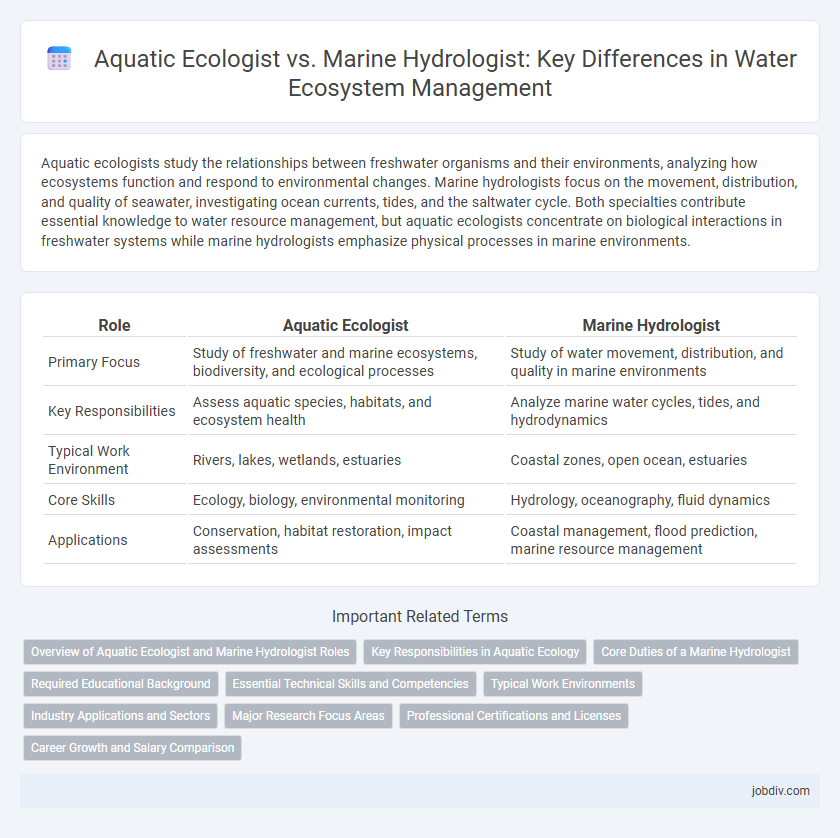Aquatic ecologists study the relationships between freshwater organisms and their environments, analyzing how ecosystems function and respond to environmental changes. Marine hydrologists focus on the movement, distribution, and quality of seawater, investigating ocean currents, tides, and the saltwater cycle. Both specialties contribute essential knowledge to water resource management, but aquatic ecologists concentrate on biological interactions in freshwater systems while marine hydrologists emphasize physical processes in marine environments.
Table of Comparison
| Role | Aquatic Ecologist | Marine Hydrologist |
|---|---|---|
| Primary Focus | Study of freshwater and marine ecosystems, biodiversity, and ecological processes | Study of water movement, distribution, and quality in marine environments |
| Key Responsibilities | Assess aquatic species, habitats, and ecosystem health | Analyze marine water cycles, tides, and hydrodynamics |
| Typical Work Environment | Rivers, lakes, wetlands, estuaries | Coastal zones, open ocean, estuaries |
| Core Skills | Ecology, biology, environmental monitoring | Hydrology, oceanography, fluid dynamics |
| Applications | Conservation, habitat restoration, impact assessments | Coastal management, flood prediction, marine resource management |
Overview of Aquatic Ecologist and Marine Hydrologist Roles
Aquatic ecologists study the relationships between aquatic organisms and their environments, focusing on freshwater and marine ecosystems to assess biodiversity, ecosystem health, and the impact of human activities. Marine hydrologists specialize in the analysis of water movement, distribution, and quality in marine environments, using hydrological data to understand ocean circulation, tidal changes, and coastal processes. Both professions require expertise in ecological principles, but aquatic ecologists emphasize biological interactions while marine hydrologists focus on physical water dynamics.
Key Responsibilities in Aquatic Ecology
Aquatic ecologists focus on studying the interactions between aquatic organisms and their environments, analyzing freshwater ecosystems, monitoring biodiversity, and assessing ecosystem health. They conduct field research to evaluate water quality, habitat conditions, and the impacts of pollutants or invasive species on aquatic life. Marine hydrologists primarily study the movement, distribution, and physical properties of seawater, often supporting aquatic ecologists by providing data on marine hydrodynamics and oceanographic processes.
Core Duties of a Marine Hydrologist
Marine Hydrologists specialize in studying the movement, distribution, and quality of saltwater in oceans and seas, utilizing data collection and modeling techniques to analyze tidal flows, underwater currents, and salinity levels. Their core duties include monitoring oceanographic conditions, assessing the impact of human activities on marine water systems, and supporting coastal management projects aimed at preserving marine ecosystems. They integrate hydrological and environmental data to inform sustainable practices and predict changes in marine water dynamics.
Required Educational Background
Aquatic ecologists typically require a bachelor's degree in ecology, biology, or environmental science, with many pursuing advanced degrees such as a master's or PhD to specialize in freshwater ecosystems. Marine hydrologists often hold degrees in hydrology, oceanography, or marine science, emphasizing fluid dynamics and saltwater environments in their studies. Both professions benefit from strong foundations in chemistry, biology, and environmental modeling to analyze aquatic systems effectively.
Essential Technical Skills and Competencies
Aquatic ecologists require expertise in biological sampling, water quality analysis, and ecosystem modeling to assess freshwater and marine habitats accurately. Marine hydrologists focus on hydrodynamic modeling, sediment transport analysis, and saline water chemistry to understand oceanographic and coastal processes. Both roles demand proficiency in GIS technology, statistical software, and field instrumentation for comprehensive aquatic environment assessment.
Typical Work Environments
Aquatic ecologists primarily conduct research in freshwater environments such as lakes, rivers, and wetlands, studying the interactions between organisms and their habitats. Marine hydrologists focus on oceanic and coastal regions, analyzing water movement, salinity, and marine ecosystems. Both professions often engage in fieldwork, laboratory analysis, and data modeling, but their environments differ by freshwater versus marine settings.
Industry Applications and Sectors
Aquatic ecologists primarily work in freshwater environments, contributing to environmental management and conservation in sectors such as fisheries, wetland restoration, and water quality assessment. Marine hydrologists specialize in studying oceanic water systems, supporting industries including offshore oil and gas, marine renewable energy, and coastal engineering projects. Both professions play critical roles in sustainable resource management, environmental impact assessments, and regulatory compliance within their respective aquatic domains.
Major Research Focus Areas
Aquatic ecologists primarily study freshwater ecosystems, focusing on the interactions among organisms and their environments in lakes, rivers, and wetlands to understand biodiversity and ecosystem health. Marine hydrologists concentrate on the movement, distribution, and physical properties of seawater, analyzing ocean currents, tides, and the impact of saltwater on coastal and marine environments. Both disciplines use interdisciplinary methods but emphasize different aquatic systems and research themes related to ecological function and hydrodynamic processes.
Professional Certifications and Licenses
Aquatic ecologists often pursue certifications such as the Certified Ecological Restoration Practitioner (CERP) or Certified Wetland Scientist (CWS) to validate their expertise in ecosystem management and conservation. Marine hydrologists typically obtain licenses related to hydrology or environmental engineering, including Professional Engineer (PE) licensure in water resources, which emphasizes their skills in water cycle analysis and coastal hydrodynamics. Both professions may also acquire specialized certifications like Geographic Information System (GIS) proficiency to enhance their capabilities in spatial data analysis related to aquatic environments.
Career Growth and Salary Comparison
Aquatic ecologists analyze freshwater ecosystems, focusing on biodiversity and pollution impact, with median salaries around $65,000, while marine hydrologists specialize in oceanographic water flow and quality, earning about $75,000 annually. Career growth for aquatic ecologists is projected at 7%, driven by environmental conservation efforts, whereas marine hydrologists face an 8% growth rate due to expanding coastal management and climate research demands. Both fields offer opportunities in government agencies, research institutions, and environmental consulting, but marine hydrology generally commands higher pay and specialized technical roles.
Aquatic Ecologist vs Marine Hydrologist Infographic

 jobdiv.com
jobdiv.com